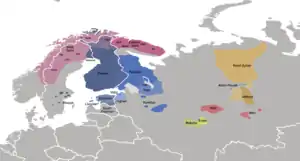Finno-Permic languages
The Finno-Permic (Fenno-Permic) or Finno-Permian (Fenno-Permian), or sometimes just Finnic (Fennic), are a proposed subdivision of the Uralic languages which comprises the Balto-Finnic languages, Sami languages, Mordvinic languages, Mari language, Permic languages and likely a number of extinct languages. In the traditional taxonomy of the Uralic languages, Finno-Permic is estimated to have split from Finno-Ugric around 3000–2500 BC, and branched into Permic languages and Finno-Volgaic languages around 2000 BC.[1] Nowadays the validity of the group as a taxonomical entity is being questioned, and the interrelationships of its five branches are debated with little consensus.[2][3]
| Finno-Permic | |
|---|---|
| Finnic | |
| Geographic distribution | Northern Fennoscandia, Baltic states, Southwestern, Southeastern, and Ural region of Russia |
| Linguistic classification | Uralic
|
| Subdivisions |
|
| Glottolog | None |
 The Finno-Permic languages | |
The term Finnic languages has often been used to designate all the Finno-Permic languages, with the term Balto-Finnic used to disambiguate the Finnic languages proper.[4][1] (In Finnish scholarly usage, Finnic most often refers to the Baltic-Finnic languages alone.[5])
Subclassification
The subclassification of the Finno-Permic languages varies among scholars. During the 20th century, most classifications treated Permic vs Finno-Volgaic as the primary division. In the 21st century, Salminen rejected Finno-Permic and Finno-Volgaic entirely.[6] Other classifications treat the five branches of Finno-Permic as follows.
| Janhunen (2009)[7] | Häkkinen (2007)[8] | Lehtinen (2007)[9] | Michalove (2002)[10] | Kulonen (2002)[11] |
|---|---|---|---|---|
|
|
|
|
|
See also
References
- Taagepera, Rein (1999). The Finno-Ugric republics and the Russian state. pp. 32–33. ISBN 0-415-91977-0.
- Salminen, Tapani (2002). "Problems in the taxonomy of the Uralic languages in the light of modern comparative studies".
- Aikio, Ante (2019). "Proto-Uralic". In Bakró-Nagy, Marianne; Laakso, Johanna; Skribnik, Elena (eds.). Oxford Guide to the Uralic Languages. Oxford, UK: Oxford University Press. pp. 1–4.
- "Finno-Ugric languages". Encyclopædia Britannica Online. 2013.
- See "The Finnic languages" by Johanna Laakso in The Circum-Baltic languages: typology and contact, p. 180.
- Salminen, Tapani (2007). "Europe and North Asia". In Christopher Moseley (ed.). Encyclopedia of the world's endangered languages. London: Routlegde. pp. 211–280.
- Janhunen, Juha (2009). "Proto-Uralic—what, where and when?" (PDF). In Jussi Ylikoski (ed.). The Quasquicentennial of the Finno-Ugrian Society. Suomalais-Ugrilaisen Seuran Toimituksia 258. Helsinki: Société Finno-Ougrienne. ISBN 978-952-5667-11-0. ISSN 0355-0230.
- Häkkinen, Jaakko 2007: Kantauralin murteutuminen vokaalivastaavuuksien valossa. Pro gradu -työ, Helsingin yliopiston Suomalais-ugrilainen laitos. http://urn.fi/URN:NBN:fi-fe20071746
- Lehtinen, Tapani (2007). Kielen vuosituhannet. Tietolipas. 215. Suomalaisen Kirjallisuuden Seura. ISBN 978-951-746-896-1.
- Michalove, Peter A. (2002) The Classification of the Uralic Languages: Lexical Evidence from Finno-Ugric. In: Finnisch-Ugrische Forschungen, vol. 57
- Kulonen, Ulla-Maija (2002). "Kielitiede ja suomen väestön juuret". In Grünthal, Riho (ed.). Ennen, muinoin. Miten menneisyyttämme tutkitaan. Tietolipas. 180. Suomalaisen Kirjallisuuden Seura. pp. 104–108. ISBN 978-951-746-332-4.
Further reading
- Abondolo, Daniel, ed. (1998). The Uralic Languages. London and New York. ISBN 0-415-08198-X.